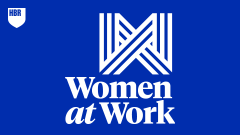AMY GALLO: Hi everyone. We have some sad news to share. This is going to be our last episode of Women at Work.
AMY BERNSTEIN: Yeah, this is a tough one, and it’s a decision that I made, purely for business reasons, but this was really hard because this podcast has been a big part of my life for a long time and has given me enormous joy. I’ve got a lot of gratification out of it; and for much of the last eight years, I guess it’s been the most fun thing I get to do. So, this is a very sad day for me.
AMY GALLO: Yeah, it is. And this show has been such a big part of our lives, and I know it’s been a big part of our listeners’ lives, so we wanted to take this episode to really talk about what the show has meant and what we are leaving you with because we’re not disappearing, but we want to invite Amanda Kersey, who you hear from occasionally, but what you don’t know, I don’t think we’ve ever done justice to the role she plays in the show. She has been from the very first episode, from the very first trailer, she has been behind the show deciding who to bring on the show, what episodes we’re doing. She shapes those episodes—
AMY GALLO: She shapes those episodes. She coaches us.
AMY BERNSTEIN: Oh my gosh, is that what it’s called?
AMY GALLO: [Laughter] Tortures us.
AMY BERNSTEIN: She scripts me. [Laughter]
AMANDA KERSEY: Hi. Yes. I’m the person who bosses you two around. Yeah, this is a difficult end. We knew it would end one day, of course, and we’ve built a legacy. I’d say we really have through. It’s not just a podcast, in the literal sense. I’m looking at our books, the Women at Work book series right in front of us. We have a newsletter, Amy G, that you write, that I used to write, that Nicole Torres wrote before me. We have done events, Women at Work Live events, we, what else have we done? Newsletter, books…
AMY GALLO: Well, we have one of the most active inboxes—
AMANDA KERSEY: We have a very active inbox.
AMY GALLO: You all write us. We write you back. We love it.
AMANDA KERSEY: I’m actually going to read from some of them—let’s play the crying game, see if I can you make you cry.
AMY GALLO: It doesn’t take much for me.
AMANDA KERSEY: Because I do want to draw attention to the impact that the show has had and some of the praise that we’ve gotten. I’ve called it “listener love” in our Slack channel, our Women at Work Slack channel. I would drop—
AMY BERNSTEIN: Oh, I love your listener love emails.
AMANDA KERSEY: —the beginning of the week, I tried to do it or the end of the week, some piece of praise to motivate us and just to share what I was hearing. Okay, so I’m going to read some. We got this one from Steph. She says, “I love this podcast. I hope to find a circle of women in my own life that talk about work like this, but until then, the podcast is such a source of support for me.” “Thank you to the Women at Work team for all you do. Your podcast has been a constant bright spot for me through the ups and downs in my career, and I’m so grateful for you.” That was from Michelle. Here’s one from Jill. She says, “First thank you so much for your podcast. Just its existence is enough on those tough days to make me feel better about the state of the world. I have heard every. single. episode., some more than once.”
AMY GALLO: Me too. I mean, I just thank every single person who wrote in with positive things, constructive things, with their stories, with their vulnerability. I think about how much we give, but I can’t express how much I’ve gotten from this show. I mean, first and foremost, my relationships with you and with the former co-hosts, the connections with listeners obviously, but even my connection with my daughter, because I’ve been able to share episodes with her. I’ve been able to invite her on the show,
HARPER (AMY’S DAUGHTER): And this is something that I did realize is that I’m not afraid to ask for what I want. You raised me with that idea that it’s okay to ask for things. You’ve definitely taught that to me.
AMY GALLO: I’m having a proud mom moment that I raised you to ask for things, but what did you see me ask for that made you feel comfortable?
HARPER: Yeah, a lot of different things. [Laughter] I think that it varies from, I’ve heard you on the phone with credit card companies and airplane companies, all these different places just asking for things. It was through example of just seeing you ask for what you want and get it.
AMY BERNSTEIN: And we watched her grow up.
AMY GALLO: I know, I know.
AMY BERNSTEIN: Now she’s going off to college. I remember when she was just a little thing and coming in and her matched top and bottom. Do you remember that?
AMY GALLO: Yeah. Stripes and polka dots.
AMY BERNSTEIN: Little stripes, and she was adorable.
AMY GALLO: Yep. Yeah, and it’s been a real gift. And the other thing I’ve gotten is my voice. I did listen to the first episode I was on, so you did two seasons without me, which I’ve forgiven you for, [laughter] but the episode where you introduced me and my voice sounds squeaky and young, and I just realized through Amanda’s adept coaching, obviously modeling you because you’ve always had such a strong voice, Amy B. But also just being able to do this all the time, I’ve found not just a calmer, more assertive voice in terms of how it sounds, but also what I want to say and what I want to be in the world.
AMANDA KERSEY: Should we tell the origin story of the show?
AMY GALLO: Yeah, let’s bring in Maureen.
AMANDA KERSEY: Let’s bring in Maureen. I’ll go get her.
AMY GALLO: So, Maureen, thank you for joining us.
MAUREEN HOCH: So happy to be here.
AMY GALLO: Appropriate since this was your idea.
MAUREEN HOCH: It was my idea.
AMY BERNSTEIN: It was absolutely your idea. [Laughter] Just for our audience, I need to say that Maureen diffidently sort of denied that this was her idea. [Laughter] I really had to come down hard on you.
AMY GALLO: You did.
AMANDA KERSEY: Yes.
MAUREEN HOCH: Well, thank you.
AMY BERNSTEIN: It was your idea.
MAUREEN HOCH: I would say as I recall, the fall of 2017, a very specific moment, the MeToo movement, stories of sexual harassment and other pressures women faced, and I was newly promoted to the role of editor of hbr.org, and I started pitching this idea of, why don’t we do a popup podcast?
AMY BERNSTEIN: Oh my gosh, I remember this. The popup.
MAUREEN HOCH: The popup podcast.
AMY GALLO: There’s a popup, six episodes!
MAUREEN HOCH: Six episodes—
AMANDA KERSEY: Seven years later…
MAUREENS: Six episodes…
SARAH GREEN CARMICHAEL (archival audio): Now we are launching this new limited-run podcast, Women at Work, six episodes each covering one of the big issues we as women have to deal with on the job.
NICOLE TORRES (archival audio): Like figuring out how to talk so that our ideas get heard.
AMY BERNSTEIN (archival audio): The challenges of being a female leader and why women aren’t advancing. I’m Amy Bernstein, editor of Harvard Business Review.
SARAH GREEN CARMICHAEL (archival audio): I’m Sarah Green Carmichael, executive editor.
NICOLE TORRES (archival audio): I’m Nicole Torres, associate editor.
AMY BERNSTEIN (archival audio): Join our conversation.
MAUREEN HOCH: And from there, I have to say Amanda and Sarah really picked up that idea and ran with it and made it what it is. And I was telling Amanda that I remembered sitting in an early meeting about the show and trying to figure out—again, at that point, we were just still hoping to do one episode, and Amanda came back with a sketch of what that episode could look like about interruptions. And I remember so clearly thinking, oh my God, we’re actually going to be able to do this because the vision that she put together made sense to me. It made sense for HBR. I thought it would do something for the audience. It was different from other things we were doing—
AMANDA KERSEY: Like getting Amy B and Nicole and Sarah to open up about their personal lives and professional lives.
MAUREEN HOCH: That was a big ask of us that I don’t know that everyone totally clapped when they got the pitch.
AMANDA KERSEY: Seven years later, we know so much about them.
MAUREEN HOCH: But I will always remember our first episode, hearing Nicole say—
NICOLE TORRES (archival audio): Let’s go back for a few minutes to the 1990s. More women were in the office increasingly working alongside men or above them, not for them.
AMY BERNSTEIN: I remember those first shows—Well, first of all, I remember that meeting and I remember thinking, well, this could be cool. And I remember thinking, I wonder who will get to host this [Laughter] because Sarah Green Carmichael came in with years of experience as the host of IdeaCast.
MAUREEN HOCH: Exactly.
AMY BERNSTEIN: Our marquee, our big pod.
MAUREEN HOCH: Yes. Our flagship.
AMY BERNSTEIN: And Nicole and I had an equal amount of experience in front of the mic, which is to say nothing. And I remember Nicole, I’m sort of looking over to where Nicole used to sit.
AMANDA KERSEY: We left that space empty. It’s like she’s with us.
AMY BERNSTEIN: But do you remember just watching her warm to the mic and become more and more comfortable and sort of come into her own? It was a beautiful thing to witness.
AMY GALLO (archival audio): Okay, how do you get out of those conversations? I cannot successfully—
AMY BERNSTEIN (archival audio): I just gave you two lines.
AMY GALLO (archival audio): Yeah, I use those lines. “I need to go get—”
AMY BERNSTEIN (archival audio): “Oh, I see someone over there I need to say hi to.” You don’t even have to make an excuse. You can say, “It was great to talk to you. I hope we run into each other again.” Something like that.
NICOLE TORRES (archival audio): OK, my line is, “I have to go.” And then I actually go.
AMY GALLO (archival audio): You leave?
NICOLE TORRES (archival audio): I leave. [Laughter]
AMY BERNSTEIN (archival audio): Wow.
AMY GALLO (archival audio): Yeah, you just walk to a different part of the room. Because think about it—
NICOLE TORRES (archival audio): But they’ll see you, and they’ll know you left them!
AMY GALLO (archival audio): Of course they’ll see you, but they want to move on too, usually.
AMY BERNSTEIN (archival audio): It’s not dating.
NICOLE TORRES (archival audio): “It was so great to talk to you. I’m going to go get another drink.”
AMY BERNSTEIN: “It was great to talk to you. See you around.”
NICOLE TORRES: “See you around.”
AMY BERNSTEIN: And I have to say a wonderful friendship grew out of that and also with Sarah Green Carmichael, who I knew, but I didn’t know the way when we all now know each other. [Laughter]
SARAH GREEN CARMICHAEL (archival audio): Yeah. I am hearing a sort of common thread between the two stories that you guys have shared, which is that people pleasing is the path to unhappiness. [Laughter]
AMY BERNSTEIN: It was a catalyst. This pod has been a catalyst for a lot of really wonderful relationships.
AMY GALLO: It’s hard to believe it’s been going on for so long, in a way. Like, to think it was a pop-up idea… By the way, piece of advice we often give is, propose something as an experiment, and then it will just become permanent. Podcast, exhibit A.
MAUREEN HOCH: Proof of concept, yes.
AMY GALLO: Exactly. But I don’t know if we ever thought we’d get to 10 seasons and seven years.
AMANDA KERSEY: Or to talk about as much as we did. I printed out every year what we—here, take, that’s 2019 [sound of Amanda handing out papers]. You take that.
AMY GALLO: Don’t give me 2020. Don’t give me 20—Oh, 21.
AMANDA KERSEY: I mean, going through everything we did, we have covered dead-end work, how to not do that. We talked about the art of claiming credit, parental leave, caregiving and elder care.
AMY GALLO: What I love is that we’ll be chatting and—with any of you—we’ll be chatting about something that’s bothering us and we’re like, oh, that’s an episode. And it’s been such a joy to be able to say, who’s the right expert? I mean, the episode about parenting teenagers while working was therapy for me.
DANNA GREENBERG (archival audio): I think the thing you have to think about is how do I best manage chaos? Not controlling chaos. You’re not going to change the chaos of Harper’s life, but what kind of management of that do you need so that you can do your work, not so that you can control the calendar or not so that you can control. That’s her.
AMY GALLO (archival audio): Why can’t I control everything, Danna?
AMY GALLO: And the fact that we get to ask Danna Greenberg, one of the foremost researchers on working motherhood, to talk it through with us, it’s just an enormous privilege.
MAUREEN HOCH: I’m looking at 2019.
AMY GALLO: Okay. Good year, good year.
AMANDA KERSEY: That was a good year!
MAUREEN HOCH: That was the season Amy G joined us. It’s a really good, great season, but I just have to say, Amy G, we were so lucky to be able to ask you to join this group.
AMY BERNSTEIN: Oh my gosh, what a natural.
AMY GALLO (archival audio): Hi, everyone.
NICOLE TORRES (archival audio): Welcome Amy…G!
AMY BERNSTEIN (archival audio): Welcome aboard, Amy G.
AMY GALLO (archival audio): Thank you. So many Amys!
AMY BERNSTEIN (archival audio): So many Amys.
SARAH GREEN CARMICHAEL (archival audio): I’m super excited. I can’t think of anyone I’d rather have take my chair.
AMY GALLO (archival audio): Thanks, Sarah. I’m actually nervous. I want to make you all proud.
MAUREEN HOCH: And not only were you already the internal counselor for so many of us here, but also just as an expert in so many things about how people communicate. So, thank you. It was like you were always on the show.
AMY GALLO: Yeah. I like to think I was there since the beginning, although I was on the first episode as a guest.
AMANDA KERSEY: Yes, you were!
AMY BERNSTEIN: Oh my gosh!
AMY GALLO: Yeah, yeah. So, I have been here since the beginning. [Laughter] I have to be included. But 2019 was the year we did, I think I did my first on-the-scene interview, with Lily Zheng, who became such a regular on our podcast.
LILY ZHENG (archival audio): I think the most important thing for managers at the end of the day is, ask your gender-diverse employees how you can help. You might say during your first one-on-one, “Hey, I want to help you have the best workplace experience you can. Is there anything that’s on your mind? Any way that I can help you out?” Just ask.
AMANDA KERSEY: What else happened in 2019?
MAUREEN HOCH: Let’s see. Okay, 2019, No Partner, No Kids, No Problem. I remember that one too.
TRACY DUMAS: Although single, childless people don’t have things like childcare responsibilities, they don’t have the same level of domestic responsibilities, what we do see in our research is that they are reporting more community involvement. They are reporting more personal development, and that’s even controlling for age.
AMANDA KERSEY: Tracy Dumas, I saw her recently at a conference. What year do you have, Amy B? What’s in front of you? Did I give you 2020?
AMY BERNSTEIN: I have 2020.
AMANDA KERSEY: 2020, the April that we had recorded multiple episodes, and then the pandemic happened, and then we dumped all those episodes and started anew.
AMY BERNSTEIN: I remember that so well.
AMY GALLO: Recording in my daughter’s bedroom.
AMY BERNSTEIN: I remember you recording in your daughter’s bedroom. I was kneeling in our closet—
AMANDA KERSEY: Under a blanket at times, remember?
AMY GALLO: [Laughter] Oh my gosh…
AMY BERNSTEIN: Under a blanket at times. And then halfway through I just said, screw it. I’m sitting at my desk in my home office, and I don’t care if it echoes because my knees hurt.
AMANDA KERSEY: We don’t want that.
AMY BERNSTEIN: And it’s hot.
AMY GALLO: It’s hot under this blanket.
AMY BERNSTEIN: I am not comfortable.
AMY GALLO: Those were hard times. But we did some good episodes.
AMY BERNSTEIN: The episodes were good. And boy, that’s probably when I felt the most acute need from our listeners for what we could bring to them.
AMANDA KERSEY: Here, let me try to make y’all cry aga





